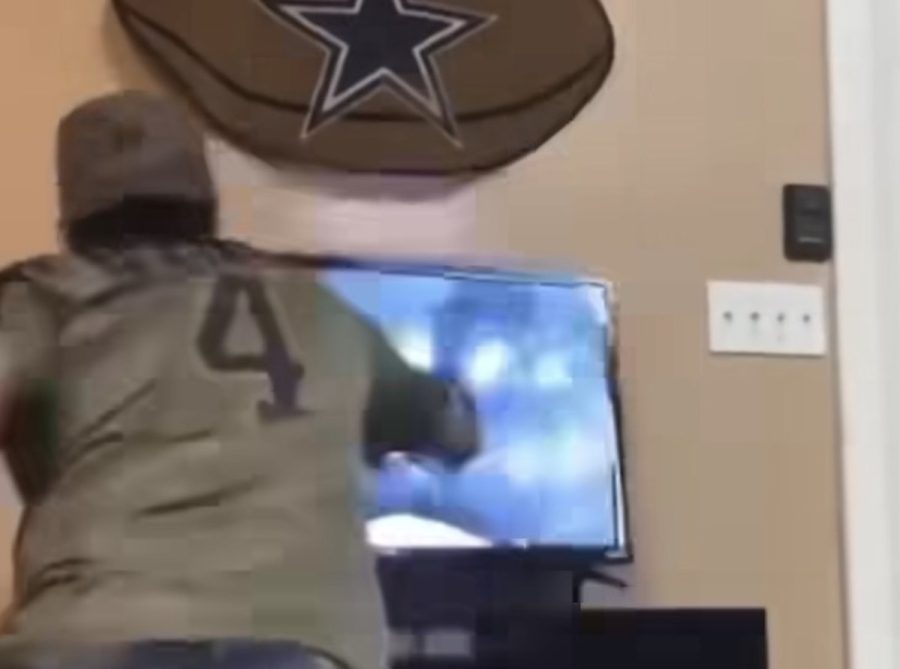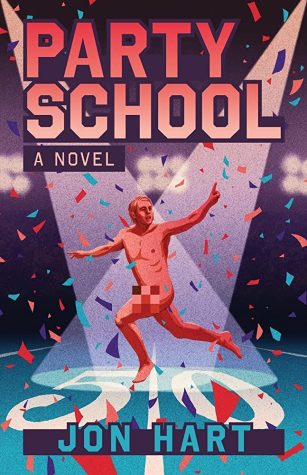“F— The Chiefs”
Sports, especially football, continue to have a connection to violence
May 5, 2023
Imagine you and your family go to see a hockey game. Tensions are high as the two opposing teams, the Flyers and the Penguins, are from places very close to one another— those places being Philadelphia and Pittsburgh respectively.
Whether you’re a huge fan of that sport/team or don’t care for it, you expect to spend quality time with your family at the game.
You sit down in your seats and watch the game. During it, you hear a group behind you talking and shouting. They’re telling one of the teams to brutalize and hurt the other. Repeatedly.
“Break their legs,” they said.
The rest of the game is spent on edge, worrying about whether or not this aggressive talk will become physical.
Sadly, this connection between sport and violence is not an imaginary idea or a one-time thing; it is a recurring relationship.
Though some may consider hockey to be a violent sport already, this violence is especially seen in football and after almost every Super Bowl game.
The Philadelphia Eagles won 41-33 against the New England Patriots in the 2018 Super Bowl. They promptly took to the streets after the victory and chaos ensued.
Thousands of Eagles fans caused various damage; they broke storefronts, looted the stores themselves, flipped over cars, etc. People injured officers and themselves, the latter by jumping off of high-up places.
Despite all of this, some reported that it appeared quite tame.
“Tens of thousands came out and celebrated this amazing victory,” says Ajeenah Amir, Philadelphia Mayor Jim Kenney’s spokesman. “And but for a handful of bad actors the celebration was peaceful and jubilant.”
These acts showcase a much more threatening nature for losses.
The Eagles were not able to win the 2023 Super Bowl against the Kansas City Chiefs, losing 35-38. People had begun to preemptively celebrate in the street before the game ended and the announcement of a winner.
This is even with the late call on James Bradberry. Upon losing, fans again made their way to the streets. This time they had a chant:
“F— the chiefs.”
From Sunday night into early Monday morning, the participants shouted many profanities in the streets, lit fireworks and clashed with the cops.
Police were involved in these riots as well; around 11 p.m. they deployed smoke bombs on the rioters to break them up and make them go home.
Some suffered from injuries, including one police officer. Over 10 people were charged, two with misdemeanors and 11 people with disorderly conduct.
New York Post writers Allie Griffin and Yaron Steinbuch, suggested that the riots were anticipated.
“Philadelphia police had prepared for a chaotic scene following the Super Bowl given the notoriously rambunctious Birds fans’ past behavior,” they wrote in their article Eagles fans flood Philly streets after Super Bowl loss: ‘F–k the Chiefs.’
Those watching the 2023 Super Bowl were not quite detached from this violence even in their own homes.
Tubi premiered a 15-second commercial during the Super Bowl, in which it seemed like someone used the remote to change the channel mid-game. It included scrolling through the catalog on different items and ended with the Tubi logo.
Many grew angry at this, unaware at first that it was a commercial. This included Juan Ayala.
He invited friends of his family over on the day of the Super Bowl to enjoy it together. They ate and watched the game happily.
Everyone had been watching the TV when the Tubi commercial came on.
“It was toward the end of the game and tensions were high,” recalled Ayala. “I thought my kids had the remote and hit a button to change the channel.”
He got up out of his seat and started shouting. Once he realized the commercial ended, he and his friends were able to laugh it off.
While he had only showcased slight confusion and anger in his words, many experienced far worse due to this commercial.
An anonymous woman detailed in a Reddit post how she and her boyfriend had been watching the Superbowl when the commercial came on.
Her boyfriend then broke out into a rage and yelled at her with various profanities as he thought she had done it. Despite anything she said to refute that, his anger only continued when he punched a hole into the wall.
He realized after the outburst that it had been a commercial and awkwardly apologized to her. However, the damage had been done. She broke up with him after seeing the way he reacted to the commercial.
“I’ve known him to get angry at things sometimes,” she explained. “But this took me off guard and I can’t forget how unsafe I felt around him during this.”
After the Super Bowl, people reported violence in bars due to upset fans believing one of the workers messed with the television. Many took their accounts to TikTok.
Chelly Reed, @chellyreed1345 on the app, lamented what happened during her time at the bar that night.
“Tubi, I didn’t find your commercial funny…I had the whole bar yelling at me,” she says.
Another victim of the commercial is Stephanie Ward, or @stephanieward__ on TikTok, who had been working at Buffalo Wild Wings that night.
“Want to know the [number] of tables that got mad and started screaming at their servers?” Ward asked. “I don’t know but the answer is however many tables we had in the restaurant at the time.”
Many videos of the reactions surfaced on TikTok. People portrayed them as “funny” despite various amounts of yelling and cursing.
The reactors as well posted tweets explaining how they yelled at everyone or they “almost shot their TV.” Even with skits coming out about how the commercial made people act, the fear and anger are evident.
One would assume that this issue is the ill-placed passion of a diehard fan, however, abuse is seen within the sports themselves through the players.
Many players with allegations or charges due to domestic and general abuse are still allowed to play professionally afterward.
Dallas Cowboys’ number 21 running back, Ezekiel Elliot, was accused of domestic abuse. The victim came forward in 2016 and spoke about the “toxic relationship” they had with Elliot. After an investigation, Elliot got suspended for six games. He still plays football to this day, though the Cowboys have since released him.
Another Dallas Cowboys player, this time number 76 defensive end Greg Hardy, was also found guilty of assault in 2014. He threw his then-girlfriend onto a futon in his home littered with assault rifles. These charges were eventually appealed and expunged from his records.
This assault happened during the offseason; he signed with the Cowboys for the new season and, originally suspended for 10 games, he only ended up suspended for four of those games due to the appeal.
It appears that whether in the home, at the event or just barely connected to it, violence cannot be escaped.
Research on this has been used to make statistics on the matter. It shows that an upset loss leads to an approximately 10 percent increase in the rate of domestic violence. There are also increases after an upset win against a rival team.
But why is this? Why do people resort to violence over a game?
Donald “Donny” Booker, an avid sports consumer and an ex-football player, explained that people “automatically want to win” and that they feel a connection to these teams like they’re family.
This connection evokes passion in the fans, which one sees in a 2007 study by Eric G. Donahue, Blanka Rip and Robert J Vallerand.
The study focused on the connection between passion and aggression in the players, but the conclusion also works for the fans as well.
“The present findings reveal that having an obsessive passion is associated with aggressive behavior,” they wrote.
This is not to say that all passion evolves into aggression or that simply being passionate is an excuse for violence. It does, however, give an explanation for the connection.
Many sports-centric gatherings involve screaming, whether it’s anguish or joy, so it makes sense that it results in anger.
Associate vice president for the Domestic Violence Center Programs at Safe Horizon, Rachel Smith, said, “When you have something like a high-stakes sporting event, you have emotions involved [that] can give a built-in excuse as to why domestic violence occurs.”












